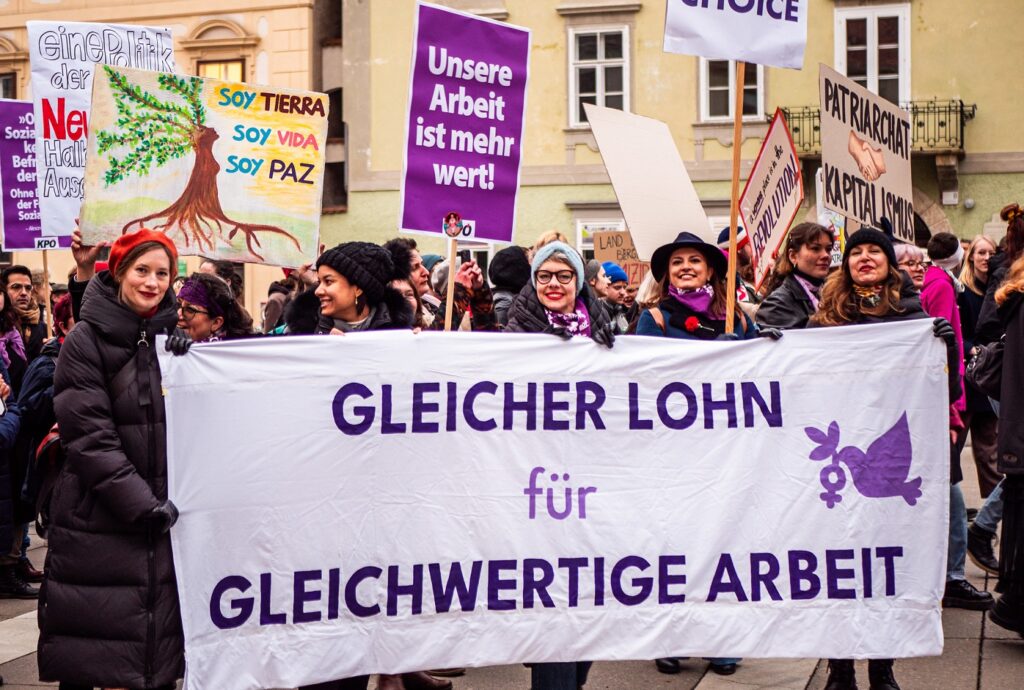Demands for a more Gender-equitable division of labour and a universal basic income (UBI) are steps in the right direction, but more is needed in terms of gender equality.
A future without gender bias is one of the goals of Austrian Federal Chancellor and ÖVP party chairman Karl Nehammer for the next term of government. Yet along with Minister of Labour Martin Kocher, he spends more of his time criticising single mothers and women in part-time employment. It seems that their biggest concern about these women is that they are not sufficiently available to the labour market and are thus undermining the future of the Austrian economy, meanwhile these mothers’ biggest concern is not having the income necessary to buy healthy food. Isn’t this the opportune time to think about a more equitable division of labour?
Simone de Beauvoir pointed out how important it is to imagine new alternatives instead of merely choosing between existing options (cited in Zerilli 2010, 250). But what kind of alternatives should we imagine? We need alternatives which lead to the freedom of women, the freedom of other socially marginalised groups, and ultimately to the freedom of all. But what do our current options look like? Right now you can choose between — or reconcile yourself to — the following options: right-wing conservative women’s and labour market policy; left-wing conservative women’s and labour market policy; left-wing feminist women’s policy with left-wing conservative labour market policy; or (finally) liberal feminist women’s policy with neoliberal labour market policy. New alternatives look different.
Invisibilising Care
What these existing alternatives have in common is that they ignore — to varying degrees — the democratic-political problem that arises when unpaid or underpaid care work is assigned to women or other marginalised groups. Joan Tronto rightly draws attention to the fact that we live in an order in which people of high status can delegate care work to others: Men to women; members of the upper class to those in poverty; those who, because of their racist attitudes, see themselves as superior to those they see as less worthy.
»From the standpoint of justice in democratic society, we should also be careful of such markings of people as the appropriate ones to do banausic work… Yet the harm of such marking is multifaceted. In the first place it signals that marked people are better suited for care work, and thus, are not equals. This is a serious danger in a democratic society.« (Tronto, 2013 : 112).
Inequality in the division of labour between men and women, between the socio-economically advantaged and disadvantaged, and between status-privileged and underprivileged groups cannot be solved at the individual level. These inequities are not a natural result of personal preferences, nor can they be simply addressed as a challenge of women’s, family, migration, social, labour market or economic policy. The question of the fair distribution of unpaid and underpaid care work is manifestly a democratic-political problem! It is imperative to create a new alternative to the existing system – no matter how much political and social headwind there is at the moment.
In this vein, the universal basic income (UBI) should also not be thought of as some king of gender-equality miracle-cure. A UBI without a well-developed infrastructure for housing, energy, transportation, health, childcare and education would be a half-measure at best. A UBI requires additional welfare state services for people with special needs. Basic infrastructures, social benefits for special needs and UBI together do not permanently relieve the majority of people of the need to earn an income from self-organised work or work offered on the labour market – and the majority of people will not only have to, but also want to.
Unconditionality is inscribed in this system: care workers must put their own needs aside, and they are also prevented from demanding improved working conditions, income, appreciation, recognition, and fairer distribution.
Does UBI offer a new perspective at all? The debate about UBI, if it is conducted from a gender-equitable perspective — which is certainly not always the case — politicises social roles and aspects of society which are “unconditional” or taken for granted. This is the most important emancipatory potential of the UBI and the new social alternatives it represents. Nancy Fraser talks about this in her book Omnivores. How capitalism devours its own foundations (Fraser 2023). Fraser write about capitalism as a social and economic system that cannibalises its own “enabling structures”. One of these “enabling structures” is all unpaid and underpaid care work. In my words, this “enabling structure” of care work is a huge “sector of unconditionality” (Appel / Prainsack 2024). In this sector, as already described, those who have been marked as particularly suitable for the provision of care work perform socially devalued activities with which they fulfil people’s existential needs. Unconditionality is structurally inscribed in this anachronistic system. Firstly, in that care workers are expected to put their needs aside in favour of the unconditional fulfilment of the needs of others. Secondly, because social norms and the political regime do not provide for or largely want to prevent demands by care workers for improved working conditions, income, appreciation and recognition, and fairer distribution.
Care Struggles
Nevertheless, there have been “care struggles” for several years (Artus et al, 2017): in the Austrian social economy, the Berlin hospital movement, the strikes of German and Austrian elementary school teachers, the self-organisation of Austrian 24-hour caregivers in the IG-24 and – on a broader civil society level – in initiatives such as Care Revolution, the Swiss women’s strikes and the Austrian alliance “Fair sorgen”. The aim of these “care struggles” is to reject the existing alternatives, and for care workers to finally speak for themselves and to shape the conditions that affect them in their daily lives. This rejection of the exploitative quality of unconditionality (they must work) strengthens the chances of making the emancipatory quality of unconditionality, as it is inherent in the idea of UBI (they should be paid for work that must be done), productive in the struggle for a gender-equitable division of labour.
Germany has just experienced battles for power in the run-up to the introduction of the citizen’s income, which have shown with glaring clarity how successfully means-tested benefits can be weaponised in the aim of politically divisive propaganda. This is by no means the kind of new alternative we should be imagining in the sense of Simone de Beauvoir. But a radically unconditional and liveable basic income, to be received as a legal entitlement by everyone living legally in the country, is. Many people will still need to be convinced of this, especially those whose working capacity is being cannibalised by capitalism’s insatiable appetite.
First published in Volksstimme, March 2023 edition. Translated by Julia Damphouse.
References
Appel, Margit / Barbara, Prainsack (2024): Arbeit – Care – Grundeinkommen. Wien / Mandelbaum Verlag
Artus, Ingrid / Birke, Peter /Kerber-Clasen, Stefan / Menz, Wolfang (Hsg.) (2017): Sorge-Kämpfe. Auseinandersetzungen um Arbeit in sozialen Dienstleistungen. Hamburg / VSA: Verlag
Fraser, Nancy (2022) Cannibal Capitalism: How our System is Devouring Democracy, Care, and the Planet – and What We Can Do About It. London / Verso
Tronto, Joan C. (2013): Caring Democracy. Markets, Equality, and Justice. New York / New York University Press
Zerilli, Linda M. G. (2010): Feminismus und der Abgrund der Freiheit. Wien / Turia + Kant
Image: International Women’s Day 2024 demonstration in Graz, Austria. Large banner: “Equal pay for equal work”. Smaller banner: “Our work is worth more!”. ©KPÖ Bundespartei flickr.com



